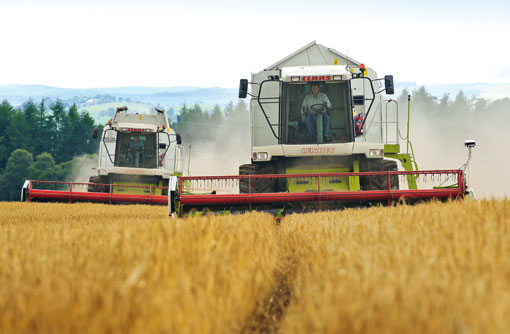Seed traders praise buy-back agreements

The launches of two innovative buy back agreements for candidate wheat varieties in June this year show that the milling industry is having some success in its aim of finding and understanding varieties earlier, say seed trade sources.
These novel contracts should have the effect of pulling the whole supply chain closer together, they add, while opening up the market for new varieties and giving growers confidence in them in their infancy.
All being well, they will also ensure that millers can get the supplies they need from the UK, they say.
“It’s the start of a trend,” believes David Waite of Frontier Agriculture. “If millers want to back varieties before recommendation, it will help get them into the market. After that, it’s up to the varieties to perform on farm. If they don’t, they won’t go any further.”
“It’s really good to see millers acting so swiftly,” agrees variety consultant Mike Jeffes. “And it’s proof that the chain can work more coherently, for the benefit of all.
“The varieties in question appear to have the right quality requirements, while also offering superior agronomic attributes. But it’s still early days and the quantities of grain will be small. Everyone gets the chance to take a closer look.”
But they must deliver to the grower, he stresses. “Without that, there isn’t a great future for them.”
Crusoe, a potential bread-making wheat from Limagrain, and Torch, a soft potential Group 3 wheat from RAGT Seeds, have both received backing from different end users, ahead of their possible recommendation later this year.
Contracts for Crusoe are being offered by Openfield, to meet the requirements of Warburtons, while Torch can be grown through Frontier Agriculture for ADM Milling, with the specific purpose of meeting the manufacturing needs of United Biscuits’ biscuit and snack brands.
Another bread-making wheat, Edgar, is also included in the Openfield/Warburtons contract. A German variety from Limagrain, it isn’t undergoing Recommended List trials in the UK, but both companies stress that it has performed very well in tests.
Mark Ringrose, trading manager at ADM Milling, explains that early backing of a candidate status wheat variety is a clear sign of the company’s continuing willingness to create supply chain partnerships.
“We’ve done similar things with variety development in the past, as our existing commitments to Cordiale and KWS Sterling show,” he points out. “In the case of Torch, collaboration with RAGT at the research and development stage allowed us to conduct flour trials on a limited amount of the variety after the 2010 harvest.”
It was the success of this trial that led ADM and RAGT to develop a volume of commercially grown Torch, to be milled into flour supplied exclusively to United Biscuits from the 2012 harvest onwards.
“It will enable us to get more robust data on the variety,” remarks Fiona Scriven, cereals and starches development manager at United Biscuits. “We have particular needs from a good biscuit wheat variety, which initial indications suggest will be met by Torch.”
The continued erosion of Group 3 plantings is a challenge for the business, she acknowledges. “This approach should help to maintain interest in the biscuit wheats.”
Bob Beard, purchasing director at Warburtons, reveals that the company first looked at Crusoe back in 2007.
“At that time, we were starting to seek a replacement for Hereward and were aware that we needed to offer choice to the grower. Just having two preferred milling varieties is risky.”
The need to match the baking standards set by Hereward and Solstice, while also being better from an agronomic view, were important considerations.
“The grower wants a lower risk variety,” he accepts. “Crusoe fits this bill and has the added benefit of being 3% higher yielding than Solstice. From our perspective, it’s reassuring to know that there are new varieties coming through.”
He agrees that it’s very unusual for a variety to be adopted so early. “We conduct very comprehensive milling and flour tests on each variety and use our test bakery in Bolton to really examine each one. So we have confidence in both Crusoe and Edgar and have already seen the consistency we look for across a range of different seasons.”
Lee Bennett of Openfield explains that Crusoe is a short, stiff strawed variety with good disease resistance, having a 7 for septoria and 9s for both mildew and yellow rust.
“It’s cleaner than the other breadmaking varieties and can be grown in first or second wheat situations. It grows well on heavy soils and can be drilled early.”
Edgar is very different, he notes. “It’s taller, but with good straw stiffness. It has very high grain quality and is more suited to thinner soils.”
Want to know more?
Check out our Seeds Focus web page containing the latest information on wheat, barley, oilseed rape and break crop varieties, including an 2012 economic outlook for each crop. Go to www.fwi.co.uk/seedsfocus

